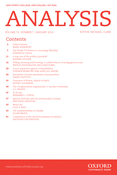-
Views
-
Cite
Cite
Clea F. Rees, Better lie!, Analysis, Volume 74, Issue 1, January 2014, Pages 59–64, https://doi.org/10.1093/analys/ant104
Close - Share Icon Share
Abstract
I argue that lying is generally morally better than mere deliberate misleading because the latter involves the exploitation of a greater trust and more seriously abuses our willingness to fulfil epistemic and moral obligations to others. Whereas the liar relies on our figuring out and accepting only what is asserted, the mere deliberate misleader depends on our actively inferring meaning beyond what is said in the form of conversational implicatures as well. When others’ epistemic and moral obligations are determined by standard assumptions of communicative cooperation and no compelling moral reason justifies mere deliberate misleading instead, one had better lie.




